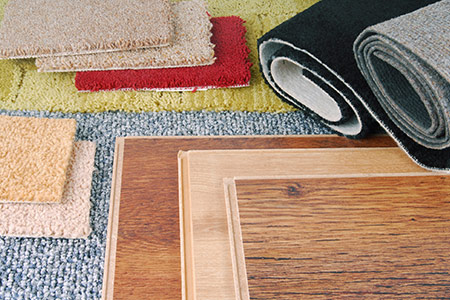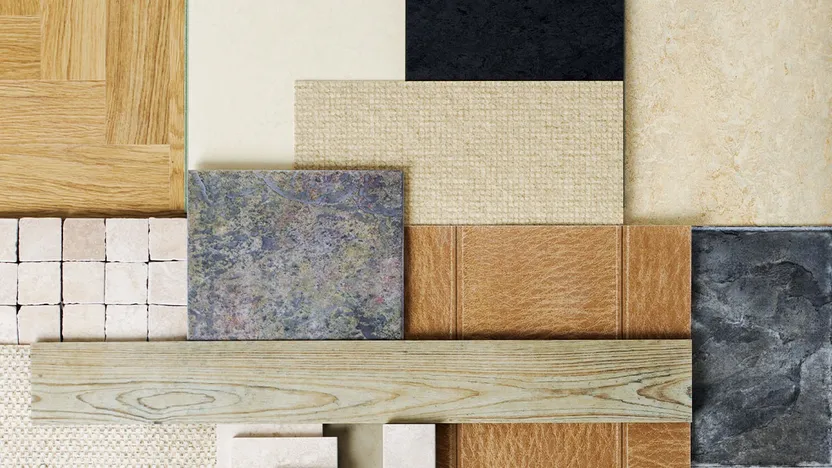Can Flooring Increase Home Value, read below to find out.
Note:
Some contents in this article may contain external links. For more information, please refer to our
Privacy Policy

As a homeowner, your mind is always occupied with ideas on how to enhance the comfort of your home. Additionally, you are determined to undertake renovations that will boost its value.
Perhaps you have already renovated the kitchen and bathrooms, or maybe you are in the process of adding new additions to your home. However, have you considered the impact of replacing the floors?
The flooring in your home can significantly influence its marketability. Prospective buyers are often drawn to properties with fresh, low-maintenance flooring. Conversely, if they dislike the existing floors in your home, it can greatly diminish the likelihood of receiving a favorable offer when you decide to sell.
Therefore, it is crucial to carefully select flooring options that will maximize the value of your home. With the multitude of choices available, it can be overwhelming to determine the most suitable decisions to make.
Continue reading to discover whether new floors can indeed increase the value of your home and how to achieve the highest possible Return On Investment.
Does New Flooring Increase Home Value?
It may come as a surprise, but potential buyers pay close attention to the condition of your floors. They are keen to assess the level of maintenance required and the types of flooring present in your home. When homeowners decide to sell their house, they typically experience a return on investment of around seventy percent with new floors. Therefore, it is safe to say that new floors can significantly increase the value of your home, provided they are installed correctly.
Does Hardwood Flooring Increase Home Value?
Hardwoods have long been the dominant choice in the flooring industry in the United States. They are highly sought after due to their desirable qualities. Additionally, they are relatively easy to maintain compared to other types of flooring.
One of the advantages of hardwood floors is their ability to be easily mopped in case of spills. However, it is important to be cautious about scratching them.
Furthermore, hardwood floors are known for their durability, making them an excellent choice for high-traffic areas like kitchens and entryways. This popularity extends to the main living spaces in homes.
Nevertheless, it is important to note that hardwood floors may not be suitable for every room. One of the main concerns is their susceptibility to rot, particularly in humid regions.
Bathrooms, in particular, may not be the best place for hardwood floors due to the frequent water spills and the potential for steam from showers to cause rot.
Different types of wood have varying levels of sturdiness, so it is crucial to select floors that can withstand the demands of the specific room being renovated.
Despite these considerations, hardwood floors offer a high return on investment and can significantly increase the value of your home.
Does Laminate Flooring Increase Home Value?
Laminate flooring is a cost-effective choice for those on a budget. It offers easy installation and can provide the look of hardwood at a fraction of the cost. Additionally, it is equally simple to clean.
Moreover, laminate flooring matches the strength of hardwood without the risk of rot. This makes it a safe option for bathrooms and homes in humid areas. Consequently, it has become a popular choice for individuals seeking to install new floors.
However, one drawback of laminate flooring is its tendency to be slippery. This makes it less suitable for individuals with limited mobility. Additionally, caution must be exercised to prevent spills, as they can make the surface even more slippery.
Now, the question arises: do laminate floors increase the value of your home?
The answer is yes, to some extent. If your current floors are old and deteriorating, almost any type of flooring will enhance the value of your home. However, in general, laminate flooring does not provide as high of a return on investment (ROI) as hardwood floors.
Nevertheless, this does not mean that laminate floors are not worthwhile. With careful planning and consideration, you can still achieve a relatively high ROI for these floors.
Does Luxury Vinyl Plank Flooring Increase Home Value?
Vinyl flooring is rapidly gaining popularity as a flooring choice due to its ability to replicate the look of natural stone or wood. It surpasses laminate in its ability to convincingly mimic these materials, all while avoiding the added expenses associated with hardwood floors.
Not only does vinyl flooring offer a convincing appearance, but it also boasts greater durability compared to laminate. This makes it an excellent option for high-traffic areas within a home. Additionally, vinyl flooring is more water-resistant, making it a safe choice for bathrooms.
In terms of cost, vinyl flooring is comparable to laminate and is easy to install and maintain. However, it’s important to note that while vinyl flooring may look authentic, it may not provide the same texture as hardwood flooring.
For those seeking the best return on investment, luxury plank vinyl is the way to go. Cheaper vinyl options may be prone to twisting and bending, resulting in reduced durability and attractiveness when compared to luxury planks.
Despite not being true hardwood, buyers will still appreciate the aesthetics and feel of these durable floors. Ultimately, these are the aspects that buyers truly value.
Therefore, installing new vinyl flooring in your home will indeed increase your property value. By employing certain strategies, you can ensure that you maximize your return on investment. This method offers an easy and cost-effective way to enhance your property’s value without straining your budget.
Can Carpet and Tile Flooring Increase Home Value?
It’s a common sight on home improvement shows: the hosts cringing at outdated or tacky carpets and tiles. However, don’t let that discourage you from investing in new tile floors or carpeting, as they can still provide a return on investment.
Generally, buyers appreciate brand-new carpets, especially if they are installed in bedrooms. However, it’s advisable to avoid installing new carpets in living spaces if you want a higher ROI.
A fresh and clean carpet is something that can increase home value, as it ensures buyers that their feet won’t feel cold when they wake up and step onto the floor.
On the other hand, choosing the right tile can be a bit more complex. Consider the material and appearance of the tile. Nevertheless, tiles are typically a safer choice for bathrooms due to their natural water resistance.
By selecting the appropriate tiles, you can give your bathroom a much-needed makeover. Additionally, tiles tend to be less slippery compared to laminate flooring.
However, one drawback of tile is its tendency to feel cold underfoot. While most buyers won’t reject a house solely for this reason, it can still be uncomfortable for many individuals.
Overall, if you make the right choices, both carpet and tile floorings can enhance the value of your home!
How to get the best ROI for your new floors
There are various ways to enhance the return on investment (ROI) when replacing your floors. Numerous homeowners have witnessed an impressive ROI of up to eighty percent. By adhering to these recommendations, you can maximize the value you receive from your investment.
Consistency
To enhance the value of your home, one of the most effective measures is to ensure consistent flooring throughout. Main living spaces should particularly have uniform flooring, while bedrooms and bathrooms can have their distinct styles. However, it is advisable to maintain consistency even in these areas.
The presence of different flooring types in each room can deter potential buyers, as it creates a disjointed and patchy appearance. Conversely, when the floors seamlessly flow from one room to another, it creates a harmonious and spacious ambiance that appeals to buyers.
Consistent flooring is not only important for aesthetic reasons but also for practicality, especially for individuals with disabilities. High thresholds between floors can pose challenges for wheelchair users, making it crucial for them to seek homes with uniform flooring throughout.
Space matters
When considering which room to refloor, it is important to take into account the specific needs of each space.
For high-traffic areas such as kitchens or entryways, it is advisable to choose a flooring option that is durable and can withstand constant foot traffic. Opting for sturdy floors will ensure longevity and minimize the need for frequent repairs or replacements.
In contrast, these areas typically do not experience significant water or steam spills. Therefore, waterproof floors may not be essential. Instead, water resistance or no water protection at all should suffice.
On the other hand, bathrooms require flooring that can withstand water and steam exposure. Although they do not typically experience as much foot traffic as kitchens, it is crucial to prioritize water resistance. This is why tile floors are a popular choice for bathrooms. They are naturally waterproof, ensuring their longevity in these moisture-prone areas. However, it is important to handle the installation carefully to avoid any breakage or cracking.
In bedrooms, the best flooring options are typically hardwoods, synthetic floors, or carpets. Tile floors may not be ideal for bedrooms as they can feel cold. It is important to consider the comfort and warmth of the space when selecting bedroom flooring.
It is recommended to maintain consistency in flooring throughout the main living areas of the house. Hardwoods or floors that resemble hardwoods tend to provide the highest return on investment in terms of aesthetics and overall value.
Location
Different regions have different preferences when it comes to flooring choices, and the climate plays a significant role in determining the ideal type of flooring. In colder climates, tile is not as popular due to its tendency to get cold. On the other hand, hardwood floors provide a slightly warmer feel underfoot, making them more favored in colder regions.
Conversely, in hot and humid areas, hardwood floors are prone to rotting at a faster rate, making them less suitable for flooring. In such regions, tile floors are more commonly chosen as they offer a cooler surface during the summer months. Since a significant amount of body heat is regulated through the feet and head, this makes tile flooring an ideal choice for hot climates.
Additionally, there are synthetic flooring options like laminate and vinyl, which offer a middle ground in terms of temperature. They are not as cold as tile nor as warm as hardwoods. These types of flooring are considered neutral and are widely used across the globe.
Regardless of where you live, laminate and vinyl flooring are both excellent options to consider for your home. However, for other types of flooring, it is crucial to carefully consider the climate of your region before making a decision.
Get your new home flooring today
New flooring can increase home value. In addition to that, there are various strategies you can employ to maximize your return on investment when selling your property. By implementing the aforementioned suggestions, you can secure a favorable selling price for your home. Contact us today for your FREE in-home consultation.
For further assistance on how to the different types of Hardwood Flooring or Engineered Wood Flooring, or general questions regarding flooring, our team of flooring experts is readily available to address your inquiries and provide tailored recommendations to meet your specific requirements. Give a call at 623-305-4390 or click here.
Share This Article

